
Gaz's Gear, Kia Sorento - a treat for towing
So, then........ Just what is a GOOD TOW VEHICLE for a small caravan?
We set about to solve the problem for the working family man, who can't afford the luxury of two vehicles, but wants a comfortable, affordable, work-horse for the holidays, that carries up to 5 people, has secure internal wagon space, and is brilliant to drive 9-5 around the suburbs as well! Tall order, but the results speak for themselves.
We're not talking any really serious off-road stuff here, but caravanners still like to reach some interesting off-road locations like the rest of us, let's face it. But the real concern is - do you need to own two vehicles? For the average traveller spending most of the year around the suburbs, driving a truck, is an uncomfortable, uneconomical experience. If you only have a small, single-axle, pop-top caravan, say over 1000kg - 1200kg, and need a vehicle for other day-to-day usage around town, then the choices become a bit tricky....... Let's assume the all up weight including your food and belongings, comes to a low 1300kg - 1500kg. In our case, a Gazal little Nova, but it could be any 12'-15' poptop styled caravan. But there are lots of 15'-17' vans weighing in at around 1800kg too, so they're well covered by our findings in this article as well.
If you're pulling a larger van, dual-axle, over 2300kg, or if you want to do some really serious white knuckle 4WD'ing, then you probably need a Nissan Patrol or Toyota Landcruiser. They'll do the job nicely in the scrub, and tow your big rig there with ease - but they're a total waste of time around the cities if you spend a lot of mileage in those areas too.
Unless you are a tradesman, or have a specific need for a ute-styled vehicle (for motorcylces, pets, or other external storage), then we've also left the crew-cab 4WD type vehicles out of the exercise. But we would hasten to admit, that if this shaped vehicle is for you, then for towing purposes, an honorable mention must be extended to the likes of the Toyota Hilux and the Nissan Navara, as these are ideal towing vehicles and can handle off-road work with ease. But they may not suit the suburban dweller seeking a more station wagon styled unit. That's what this article addresses.
We looked at the practical and technical issues often overlooked by people who think towing is a matter of just putting the van onto the towball. We'd highly recommend that if this is you, then it is time to take a course on towing and awareness of the safety aspects when sitting at 100km/h towing what is trickier than an articulated vehicle - particularly with family onboard, and an obstacle confronts you in the dark, when wet and at high speed. Does your choice of vehicle cover the risk of that eventuality?
What we uncovered was much more. Traction control, decent low down torque for towing, economical running around town, easy parking, and creature comforts all came into the equation. Not to mention price, overall running costs, future service costs, and resale values.
And we were surprised at what was missing on some of the big-ticket vehicles offered today. So much so, stay tuned for an article on traction control, ABS, ESP, and similar technologies in the future.
here's a few aspects you may have overlooked
...... from a 'towing' point of view.
the ideal features would have to be:
- efficient diesel engine. A "common rail" simple, reliable design.
- plenty of torque and low gearing (say 350Nm +, and 5 or 6 gears)
- automatic for easy take-off up hills with a load, and for backing
- clearance for going up steep driveways (no towabll drag!)
- a way of avoiding getting bogged - the right type of diff(s).
- ensuring you don't get stranded when two opposing wheels slip
- low range for some off-road enjoyment at your camping destination
- lift back door providing weather protection to your cargo in the back (and clearance from towbars and a-frames, to get the van on!)
- spare wheel out of the way - easier to see out back when backing (say underneath, where it is always accessible, in emergency)
- confidence that spare parts and servicing is available out of town
- selectable 2WD (rear wheel only), with 4WD when desired
- ability to drive all four wheels - not just both tail shafts!
- and if towing/braking under 1500kg, lets not pay for a big truck.....
- How much to spend? $30K, $40K, $50K, $60K or nearly $70K?
On paper, the tested models offer a solution, at each of these price levels.
So...... Can say, a KIA Sorento EX, Diesel, (5sp Auto) step up to the task?
We took quite a few others for a spin too, to compare........
Here's what we tested and experienced.
Here are the typical towing obstacles:
- Angled driveways over culverts causing two opposing wheels in the air
- Deep gutters, losing rear end traction.
- Steep driveways causing towball bottoming out.
- A Low towball preventing you leaving hitches on.
- Wide / tall vehicles that limit access
- Sideways opening doors that prevent access when towing
- rear wheels on doors, may prevent towbar to towball access
- extending towbar tongues that reduce departure angle !
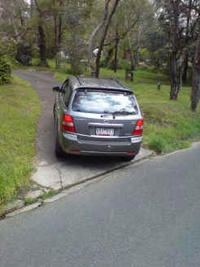 1 1 |
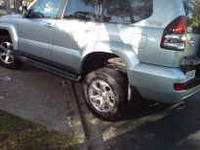 1 1 |
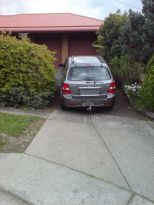 1 1 |
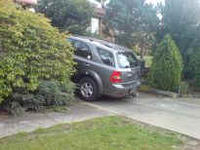 1 1 |
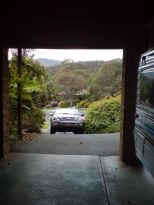 1 1 |
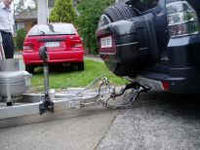 1 1 |
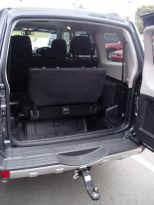 1 1 |
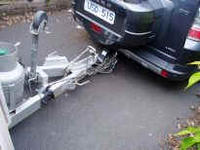 1 1 |
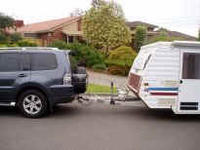 1 1 |
By the way: Does our own HITCH KIT fit the new car?
50x50mm shafts vary from different car makers!
We have a genuine Hayman Reese from the last car, and the caravan has been setup with three jockey wheel connectors and gas bottle located to suit - so we don't want to change all that again! What have you already invested in?
Pricing and negotiations
In the end, you will need to have servicing and you will undoubtedly need to talk about adding things like UHF radios, towing brake controllers, hands-free kits, RDFS radio, shelving, cargo protectors... and so forth. In our case we also wanted additional wiring for special communication facilities (ABSoutback3). So a good relationship with the dealership you finally do business with, must be a balanced decision based not purely on initial costs, but, courtesy, service and future costs.
So obtain 3 or 4 quotes, meet the service manager and their team - and talk to existing owners of the car you are looking at. Particularly, talk to owners that have used one for say 100,000kms to see how they've gone. Forums on the internet are an invaluable source of information, but be sure to follow up any unusual information that may be an owner-error.
GAZ's TIPS:
So Gaz has come up with a list of cost related matters to consider:
- Are you eligible for a fleet, or ABN discount for purchase?
- Negotiate the dealer delivery charge
- Compare the real content and value to you, of any extended warranties. For us, who travel out of town a lot, then a warranty that requires attendance to a specific dealership is impossible to avail of - so we chose a manufacturer AUST WIDE warranty
- Document to the dealer, what you intend to use the vehicle for. Then you can compare the value of their servicing/warranty offers.
- Clearly document and compare all the options you want. Towbars, wiring, tinting, protection strips, nudge bars etc etc. It all adds up.
- Be sure to get estimates of future servicing costs (say 3-5 yrs). It is the major services, and the intervals that must be clearly compared. Pinpoint items like timing chains versus belts - be sure you understand whether these are a serious cost item or not.
- Check that the dealership quotation lists all your options and also outlines estimates of future servicing costs - no surprises!
- Take note of any trimmings - like a free tank of Deisel - its all your money!
- Compare the on-road cost - with GST, stamp duty, rego, TPI and D/Del.
- Then consider the adjustment for any trade-in - shop around or sell private.
So.... what's available on the market?
(October 2007, Melbourne, Australia)
NOTE: we've deliberately left out Toyota Landcruiser and Nissan Patrol, on the basis that the caravan being considered is well under 2800kg, single axle, and there is no need for really serious off-road 4WD activities. These two fine heavy-duty vehicles are considered overkill for the comparative needs under review in this article. They also represent a style of vehicle that we believe is uneconomical for non-towing day-to-day use around the suburbs.
Here's some indicative comparisons..... |
PROS |
CONS |
$65,000 Toyota Prado GX (Diesel) |
Pros: proven, excellent wheel travel, good gears/diff abilities (4WD-L). Tank: 180L. |
Cons: most expensive, rear door opens outward, has wheel on door, No security blind for rear cargo (not even an option). Length: 4850. Turning: 11.4m. Towing: only 2500kg - small for its size. |
$56,000 Nissan Pathfinder ST-L (Diesel) |
Pros: nice ride (independent suspension all round), |
Cons: also expensive. Length 4740. Circle: 11.9m. Tank: 80L ABLS does NOT work when in 2WD. Awaiting confirmation if ABLS works in 4H. |
$55,000 Mitsubishi Pajero GLX 5-door (Diesel) |
Pros: 358Nm @2000 |
Cons: rear door opens outward, with wheel on door. Test vehicle went into ECU limp mode, requiring return to dealership to reset. |
$43,000 Kia Sorento EX (Auto) (Diesel) GREAT FOR CARAVANNERS: Note: In 2WD, if you manually choose to de-select ESP, then you lose Traction Control too. But just don't de-select it! |
Pros: great value for money, simple 2WD or 4WD hi/lo selection, Small compact size (only 4590L x1884W x 1810H), 392Nm@2000rpm. Security blind (std). Tight turning circle: 11m TRACTION CONTROL Super low speed (4L) down-hill assist - great! Brilliant lights for night. Great fuel economy, as tested by us:
|
Cons: Slightly firmer ride, but to be expected for a live rear-axle - worth it for towing ability. |
$44,000 Jeep Cherokee Sport (Diesel) |
Pros: small size, good price, 400Nm @1800-2400. Selec-Trac® NV242 full-time 4WD system |
Cons: |
$39,000 Hyundai Terracan (Diesel) |
Pros: Tremendous value for money. 345Nm @1750 thru 3000 range. 2500kg towing |
Cons: limited color range. Unfortunately, now a discontinued line (only Euro III compliant - not current Euro IV) |
Landrover Discovery TDV6 (Diesel) |
|
Cons: Price |
Toyota Kluger (Petrol Only) |
|
Cons: Price, petrol only, AWD |
Mitsubishi Outlander VRX Petrol only |
Pros: Compact/comfortable. 6 speed auto or manual |
Cons: only 1600kg towing. 276Nm @ 4000rpm. No deisel. |
Subaru Outback 3.0R (std) (Petrol Only) |
Pros: Nice car to travel in - but undersized for towing. Price for non-premium model. |
Cons: AWD is FWD. No LSD or Assisted braking. Viscous Coupling. 6cyl is only 1800kg towing capacity. Very expensive for Premium models. No deisel. |
Nissan X-trail ST-L (Petrol only) |
Pros: Low cost for around town as a non-towing vehicle |
Cons: towing 2000kg. |
Suzuki Grand Vitara (Petrol only) |
|
Cons: |
Holden Captiva SX (Diesel) |
|
Cons: FWD bias with its AWD design. Towing only: 1700kg for diesel. |
Ford Territory TX (AWD) (Petrol Only) |
|
Cons: AWD is FWD. (RWD only model - n/a) |
Subaru Forester XS Wagon (Petrol Only) |
Pros: great light off-roader (but not towing) |
Cons: no 6 cyl. no low torque. AWD is FWD. Viscous coupling. |
ALSO: Not considered by us Note: In our caravanning travels, Hilux and Navara both feature very highly, but you need to decide if you want a UTE type shape. |
Toyota Hilux Diesel, Nissan Navara Diesel, Holden Rodeo |
ALSO: Not considered, |
An honorable mention should be made for the FORD BA Sedan, which is a well known and respected tow vehicle, but the writer's needs are for a 'wagon' shaped vehicle to suit day-to-day business use. |
** availability of demo vehicles with proper 50x50 Hayman Reese type towbar, 7-pin wiring and brake controllers. |
** ABS is looking to use portable brake controllers for aiding in the availability of vehicles for demonstrating towing abilities of more than 750kg capacity. It is rare to find demos with legal 1500kg brake systems fitted |
Views and opinions expressed here, are personal, and based on the needs of the reviewer for the intended vehicle usage described,
and as such may not reflect the requirements of all readers.
The topics and points raised are for the purpose of illustrating the many variations in designs and features offered by car makers. Additional research was often needed to find out more about the capacity, mechanical operations, suspension and 2WD/AWD/4WD methodologies of the models considered.
This required calls direct to the manufacturer themselves, in order to get additional technical information.
All errors or omissions excepted.

